RV camping is the perfect middle ground between camping in a tent and having some creature comforts to make your camping experience a bit more comfortable.
The amount of facilities that are available to make your camping more convenient can vary quite a bit from one RV campground to the next.
How is RV camping different from regular camping?
RV camping is easier to set up than basic tent camping. Contrary to what some people think, however, it doesn’t mean you’re going to be cooped up in your RV, missing out on the beauty of nature.
You can get the best of both worlds when RV camping: the luxuries or comforts and the feeling of being immersed in nature. It’s also less stressful because you’ll have everything you need to have an amazing camping experience right in your RV.
Where You Can Camp With Your RV
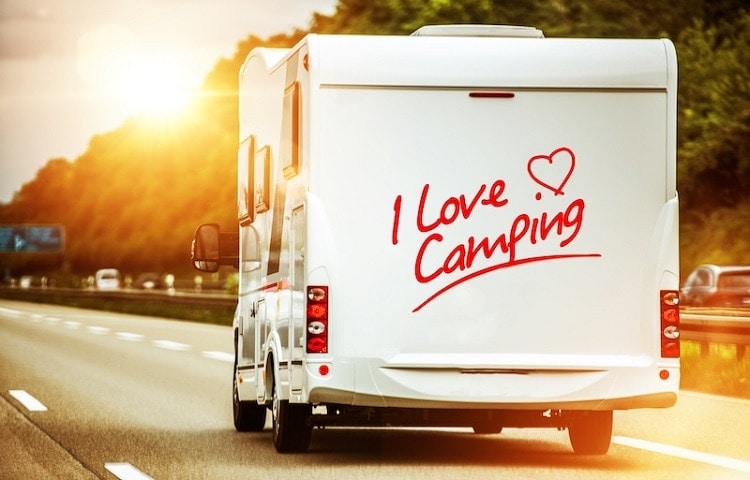
There are many campgrounds that cater to RVs. These include primitive, partial hookup campsites, and full-hookup campgrounds.
Here is where they’ll vary with the facilities that they offer.
- Primitive campgrounds usually won’t give you basic amenities such as water and electricity, so you’ll have to supply your own.
- Partial hookup sites will have water and electricity hookups, but you won’t be able to make use of a sewer. A dump station will be required so you can get rid of your black and gray water tanks.
- Full hookup campgrounds have everything you need: water, electricity, and sewer connections. You’ll also find that they offer much more, such as Wi-Fi, cable television, and other amenities, depending on the campground in question.
What About Boondocking?
Along the way to your destination, you might have to stop overnight. The good thing about RVs is that they enable you to park and stop in a variety of places.
You can also take part in boondocking. This refers to using federal public lands that are within a specific distance to an established road. You can use previous campsites or areas that will not be damaged by your RV to boondock, as long as you camp further than 300 feet from the closest water source.
It’s also worth knowing that you can park and boondock with your RV in some U.S. national parks but this tends to be restricted to established campgrounds. When it comes to private campgrounds, you can find some that will allow you to boondock for a small fee.
You won’t be able to stay for an unlimited period of time, of course. You will have to check what the limit is for how long you can stay, but RVs give you lots of opportunities while camping and best of all they keep you mobile.
How To Find The Perfect RV Campsite
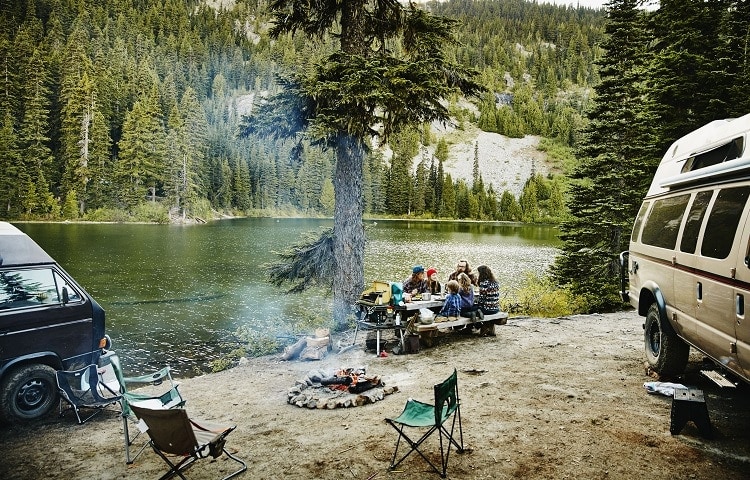
There are different ways in which you can make the most of RV camping. Here’s a rundown of some of the most common RV campsites you’ll find.
RV Campgrounds
These are the most basic and they’re great because they allow you to have a spot in nature where you can camp with your RV. These campgrounds can be found in state and national parks, but other times you can find campgrounds where you will just have a fire pit and other amenities, such as dump sites.
Many campgrounds will allow long-term RV usage but you want to have lots of amenities to make your stay more comfortable for the long term, which is why your best bet is to choose privately-owned parks, KOA camps, or luxury RV parks.
RV Parks
These usually don’t have as much access to nature for you to enjoy. RV parks will have more parking sites, as well as common amenities such as cable TV hookups or playgrounds for kids to enjoy, but what they offer can vary quite a bit from one RV park to another. You can usually stay in an RV park for up to 14 days.
RV Resorts
These are as close to civilization as you’re going to get and can take the form of RV glamping. The resorts are maintained well and have many amenities, such as nearby fitness centers, clubhouses, and restaurants. They’re probably best for the first time RV camper as they’re a nice introduction into RV life!
Can You Camp In An RV In Winter?
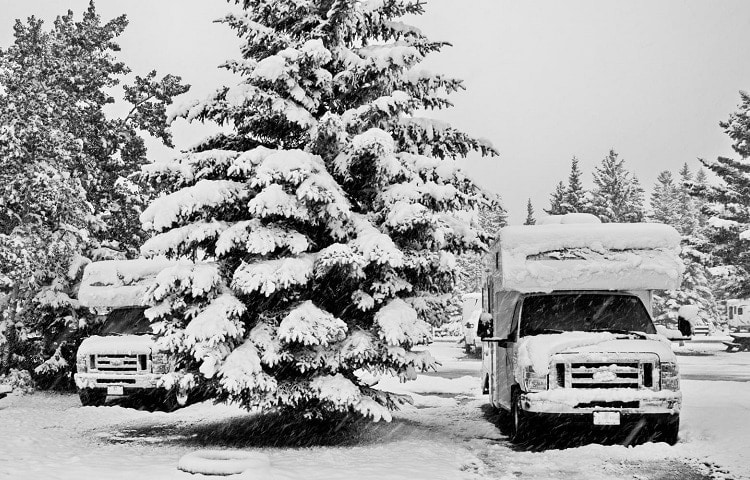
You can camp in your RV during the colder months, and it’s certainly easier to do than tent camping that can be inhibited by freezing temperatures, but you’ll need to do a bit more planning to ensure that you don’t cause your RV any damage and that you ensure a most comfortable experience.
Here’s a rundown of some important things you should do to prepare your RV for the cold months.
- Install insulation. This will keep your RV warmer and will protect its components from getting damaged. You want to insulate the base of the RV and seal all the windows and doors to block out the cold wind. Make sure you also replace any caulking around the windows. You should insulate the floors, such as with the use of foam board flooring or by making use of heavy carpets.
- Take care of the plumbing. While you’re insulating the vehicle, you should also make sure you insulate the plumbing, such as by applying heat tape around pipes and hoses. This will prevent them from freezing and keep them in good condition all through the winter months.
- Get the right tools. To prepare for winter RV camping, you’ll need to have the right tools and equipment to remove ice from your RV’s roof, tires, side awnings, and windshield with the use of a shovel. You might also need chains for the tires if you’ll be driving through very icy weather and an engine block heater. This will help to warm up the RV’s engine before you need to drive it.
Other safety equipments you should always have in your RV when camping in winter include the following:
- First aid kit
- Tow strap
- Portable jump starter (and USB charger)
- Radio
- Hand warmers
- Flashlight
When camping with your RV during the wintertime, it’s good to ensure that you find a sunny spot for the vehicle. This prevents you from having to shovel away a lot of ice during the cold months and it can also help to reduce the risk of your RV’s pipes freezing, therefore making your camping experience much less stressful.
If you’re camping near hillsides during the snowy season, you want to avoid setting up your RV at the bottom of a hillside as this can put you at risk of an avalanche. Try to look for a better RV winter destination that is safe, offers comfort and convenient hookups at the same time.
Is RV Camping Expensive?
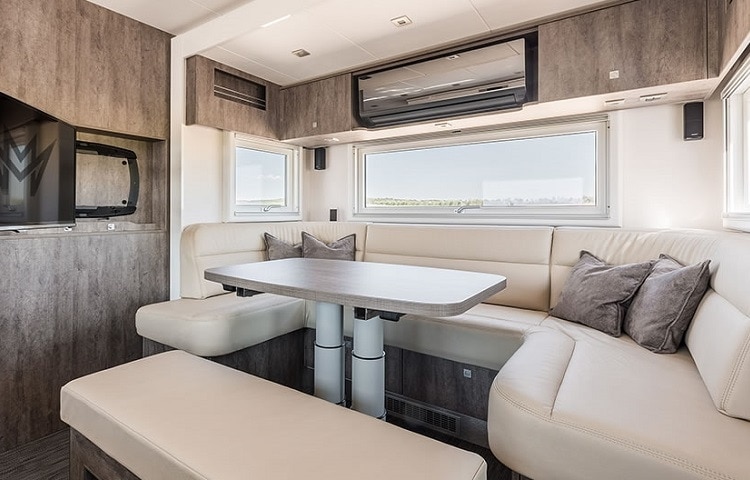
We’ve talked about the extra amenities you’ll usually find when camping with your RV instead of in a tent, but does that mean RV camping is expensive?
Here’s what you need to know.
Compared to packing up a tent and backpack and heading out to a campsite, RV camping can be more expensive. This is because of various factors, such as the following:
- RVs require more maintenance than standard vehicles because they’re a car and house in one. Your RV has many features that need to be looked after in order to ensure that they run properly, such as the sewer system, air conditioner, generator, propane tank, fridge, stove, and more.
- You’ll require some essential basic equipment for your RV, such as a water hose, water pressure regulator, and sewer hose (which together will cost you $150, according to HuffPost), while you’ll also need an electrical management system that works in a similar way to a surge protector, and this can cost up to $300. That’s even before you purchase what you’ll need for your camping trip!
- You’ll need RV insurance. The rates of insurance that you will have to pay will vary from one state to another, but the states that offer the lowest rates are North Carolina ($860 per year) and Massachusetts ($1,100 per year), as Insider reports.
That said, you can make RV camping more budget-friendly. For starters, you can give those expensive RV campgrounds a miss in favor of setting up your RV in a Bureau of Land Management (BLM) campground. You can camp on this land for free unless there are signs that say camping is prohibited.
You can find BLM campgrounds that are primitive or established, so there’s something for everyone. You can usually stay on this land indefinitely if you’re boondocking but you have to be able to move from one place to another because you can’t actually live on BLM land.
Here are other tips to reduce the cost of RV camping.
- Choose campsites with fewer amenities. While RV resorts with all the amenities you can think of will be tempting, these can quickly notch up the costs. Sometimes the amenities are not even ones you really need, so consider them before you sign up.
- Make sure you have the amenities you need in your RV. An example is a laundry. While it might be more expensive to have laundry amenities in your RV, this will be cheaper in the long run because having to use laundromats will be expensive if you’re traveling with a lot of family members. Laundromat fees are generally $2 per load.
- Try cooking in your RV. It will save you lots of money to make your own food in your RV instead of relying on eateries nearby. There are many on-a-budget camping food that are available out there. It will also be a fun bonding experience with your loved ones. Get inspired by this video, Cooking From Scratch In A RV. It will ensure you can bring some homely comforts to your camping adventures, wherever they are taking place.
- Go camping at certain times of the year. The warmer the weather is, the more people will be wanting to make use of RV camping, so it’s a better idea to camp when the weather starts to cool down. Sometimes you could find yourself paying double the rate in the months of April to September! While you’re looking at campsite rent that’s approximately $45 per month (for a campground that has average amenities), this could be lower during the colder months.
- Try to find the least costly route to get to the campground. Research the route you’re going to take to your RV campground so that you can find the most budget-friendly way of traveling. This will help you save money, such as by avoiding toll roads and by avoiding lots of traffic which will use up gas because you’re always having to come to a stop. Linked to the above point, you can also save money on gas by starting your journey in the early hours to avoid rush-hour traffic. Filling up your RV with gas can cost anything from $60 to $600, depending on the size of its fuel tank.
- Make use of overnight stops. It can be useful to know that you can park your RV overnight in a variety of places, such as Walmart, Camping World, and Cracker Barrel, to mention a few. These can help you to cut costs along your way.
- Consider purchasing a previously-owned RV. This can cut down your initial RV costs and offers many other benefits, such as lower insurance rates and a significant decrease in the purchase price of the vehicle. That said if you plan on doing upgrades to the previously-owned RV, such as because it’s really old, then that could be quite expensive in the future. If you’re not going to be RV camping that regularly, then renting could be the perfect solution to the buying new vs. used debate.
Should You Rent An RV?
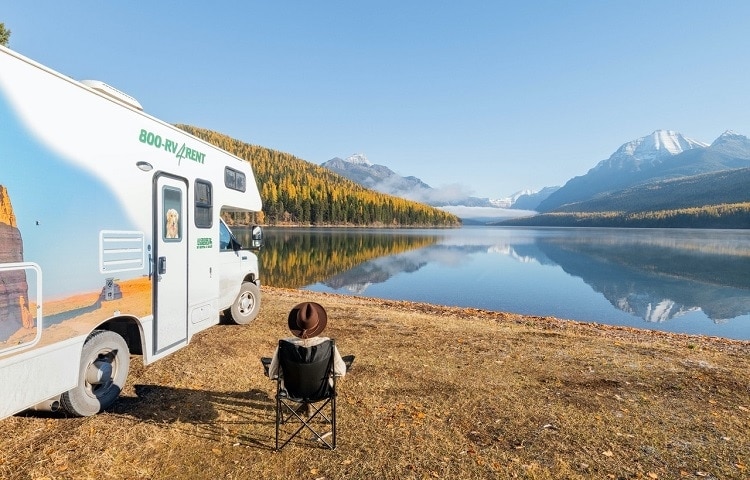
One of the things you might consider is renting an RV instead of buying a new one. This is a fantastic idea if you’re going RV camping for the first time because renting an RV will give you the experience of what it’s like and show you if you’d like to invest in an RV purchase in the future.
- You can test out different models. Renting an RV gives you the freedom to try out different RVs, such as when it comes to their size and how many amenities they have. This will show you what amenities you thought you needed but actually didn’t, and/or show you what features are worth looking for in a new RV.
- You’ll also save money on RV maintenance. One of the best things about renting an RV instead of owning one is that you don’t have to worry about maintenance and repairs. The rental company is responsible for that and will ensure that the RV meets the high standards to give you a reliable experience.
- It’s more practical to fit your lifestyle. If you’re using an RV for one or two trips in a year, it makes much more sense to rent than to purchase a brand new RV. If you don’t use an RV very often, this will save you tons of money per year. Here’s a rundown of RV rental costs that you can expect:
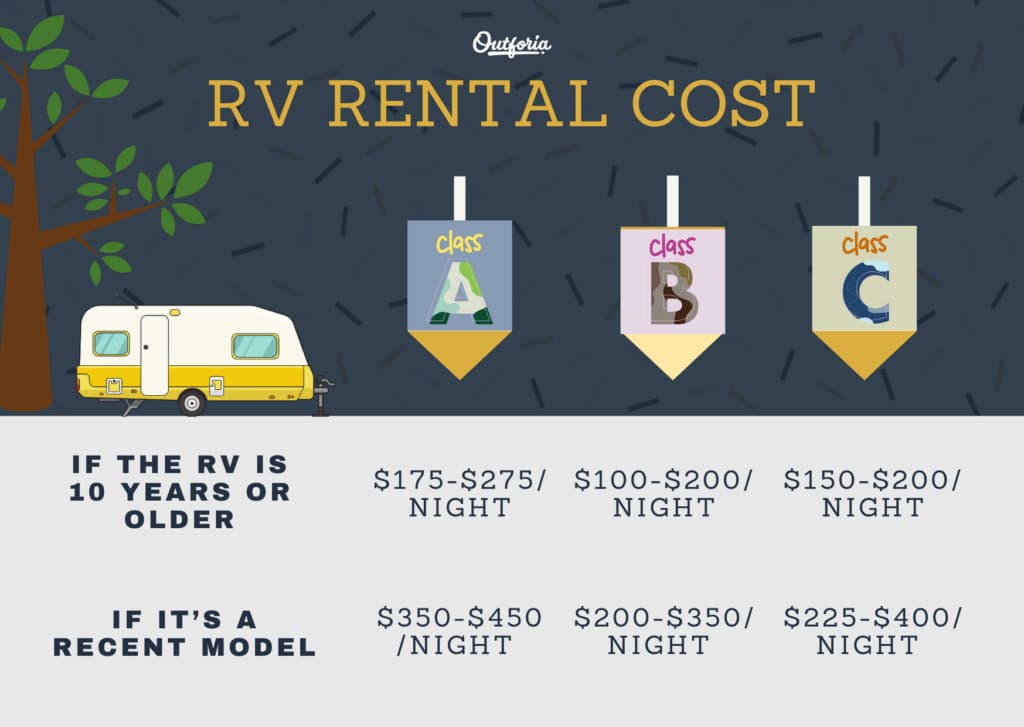
Related Questions
For how long can you park an RV on the street?
City laws prevent vehicles from parking in a single spot for longer than 72 hours, so that applies to motorhomes too.
Can you live permanently in an RV?
You can enjoy long-term stays in an RV park but you might have to move the RV every now and then or leave the park for a few days.
Conclusion
Traveling in an RV can give you a taste for freedom while making camping a much more convenient and comfortable experience.
However, that doesn’t mean it has to be expensive. If you have any questions, comment in the section below. Go ahead and let us know what RV camping tricks and hacks you have up your sleeve.








